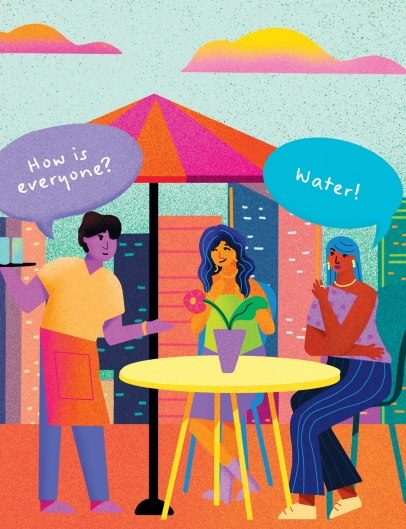Be Our (Great) Guest
An Informal Guide on Dining Etiquette
There is a word I recently stumbled upon: sonder. A somewhat newly originated noun, sonder is the realization that every person around you experiences joys, troubles, various patterns of life, heartaches, and everything in between. In the context of a restaurant, bar, or coffee shop, this phenomenon reminds us that servers, like guests, have the same desire to be treated with empathy, respect, and kindness.
What I provide here is an informal guide to how we can become better. After working in the restaurant industry for fifteen years and interacting with guests of all types, I have witnessed my fair share of phenomenal guests sit in our city’s dining rooms and interact in positive and impactful ways with staff. Anytime a front of house worker encounters a great guest, it reminds us why we do what we do. Not-so- great guests exist, too, and, as the saying goes, there is always room for improvement.
So, what does it mean to be a great guest? Let’s begin.
Reservations: This one might sting. A reservation guarantees a table, not a precise time. Reservations help provide a smooth transition between guests, but no server can control the future. Give them grace as they work tirelessly to seat you. If you feel like paying it forward, ask your server about the next reservation at your table and prevent a timing ripple effect for the rest of the night.
Greetings: They exist for a reason. At its best, hospitality is a dance, not a tug of war. Make it easy. When a server greets you at your table and asks how you’re doing, do not curtly respond with your drink order. (See cartoon - this happens frequently) Be kind, acknowledge your server’s existence, and use their name. It shows you care.
Menu and modifications: Try the dish as composed. Chefs and their team engage in intense research and development to ensure the dishes created are not only well-balanced in flavor, but visual presentation. When you ask the server what they recommend, please listen carefully to their suggestions and descriptions to ensure the dish aligns with your palate. The staff endures rigorous training to learn the menu and the ingredients. Trust me, I used to make sure of it! Too often, when guests take liberties with modifications they end up sending the dish back. This same concept applies to house crafted cocktails; don’t change the specs on a cocktail and then complain when it doesn’t taste the way you thought it would.
To my allergy crowd, do what you need to do, but please follow the restaurant established allergy menu.
No Bueno?! No Problem! If something isn’t to your liking, please let the server know! If you’re starting to feel tempted to post online that your experience was subpar, inform the restaurant in real time instead. They are NOT going to mess with your food or drink. Please, believe me. They want you to have the experience you imagined and improve where possible. Even though I trained my team to ask the guest if everything was okay when the dish remained untouched, not everyone will ask that. If you inform your server that your order just wasn’t for you, it creates the opportunity to fix or replace it.
The Check: Don’t make the server a pawn when fighting over the check. The rule I gave my team: whomever gives the card first gets to pay the tab, regardless of who tries afterwards. Don’t put your server in awkward situations. It’s uncomfortable and treats them like a tool in your game. On the same note, stop asking your server how much you should tip. Use your best and most generous judgment.
Eating at a restaurant should be a fun experience, a time to unwind and enjoy the fullest of another’s company. Being a novice or seasoned diner shouldn’t matter when it comes to being a great guest. We often forget that hospitality is a two-way street. Servers are there to partner in a dance, not to be your servant. We can be better guests, not for reward, but because we are all experiencing the richness of this vast life together. We should each strive to be a guest that sonders.






